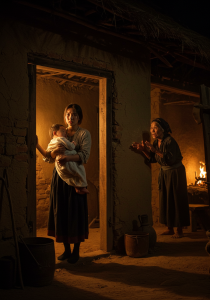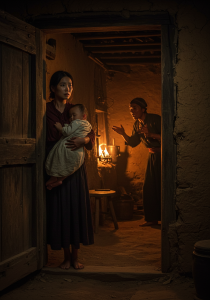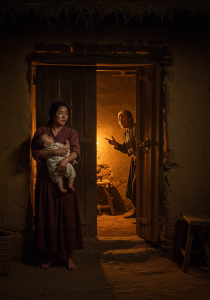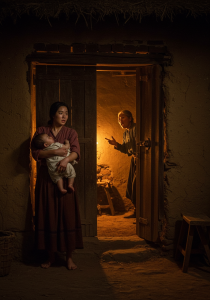My Mother-in-Law Whispered in the Night to a Strange Man: “Don’t Let Her Suspect, Make It Clean” – I Was Terrified and Fled with My Child

My Mother-in-Law Whispered in the Night to a Strange Man: “Don’t Let Her Suspect, Make It Clean” – I Was Terrified and Fled with My Child
The house sat low behind a small levee, its corrugated metal roof weathered and sagging, bearing the weight of time, rain, and sun. Trúc sat by the window, gently patting her two-month-old son who was sleeping soundly in her arms.
The sunlight slanted through the window, casting a dry golden hue over her pale skin. After giving birth to Pin, she returned to live with her husband’s family in a riverside rural area. Life wasn’t something she chose—it was something she had to accept.
Hưng, her husband, used to be a civil engineer, but he lost his job when construction sites shut down during the pandemic.
She had quit her job during her seventh month of pregnancy. Now, all living expenses depended on the small income from her mother-in-law’s convenience store. Mrs. Sáu, a widow for over a decade, lived for pride and rigid principles. She maintained a respectable outward appearance, but was harsh and cold toward her daughter-in-law. Since the day Trúc moved into the house, she had never heard a kind word from her mother-in-law—only constant nagging: “Waking up this late—how can you call yourself a mother?” “If you’re eating in this house, you’d better learn your place.”
Trúc had gotten used to it—or rather, had no choice but to get used to it.
One day, just after breastfeeding, before she could clear the dishes, Mrs. Sáu stood by and sighed: “Back when I gave birth, I was back in the rice fields three days later. You girls now just lie around like princesses.”
Trúc didn’t respond, only lowered her head and carried the dishes to the sink, her hands trembling from frustration. Once, she cried from the pain of postpartum stitches, and Mrs. Sáu merely glanced and said: “You think you’re the only one who ever gave birth?”
Hưng was like a shadow—saying barely three sentences a day. If his mother scolded, he kept silent. If Trúc cried, he walked away. Many nights, Trúc lay with her back to him, tears soaking her pillow. She felt like a misplaced object—unwanted, unprotected
 .
.
She had two mothers. One, her biological mother, lived in her old house over 10 kilometers away. They spoke on the phone weekly, but she had never been allowed to visit due to the family’s belief in keeping outsiders away during a newborn’s early months.
The other was her mother-in-law—living under the same roof, yet separated by an invisible wall of stone.
But never had Trúc imagined that a third “mother” would soon appear—one from the shadows of the past, a secret hidden for 27 years.
Everything began on the sixth night of the lunar month, when she was breastfeeding and overheard a sentence that shattered her soul.
That night, the wind whistled through the tin roof like an old soul’s lament.
Trúc awoke as Pin began to fuss. She gently gathered him and sat in the chair by the window. In the soft yellow light, her gaunt face and messy hair were reflected faintly. She was dozing when suddenly creeeak—the rusty kitchen door hinges squealed. Trúc froze.
At this hour, everyone should be asleep. But now came whispers—low, forced, hushed.
“She’s still awake. Wait till she sleeps, then we move.”
A dry, cold woman’s voice. Mrs. Sáu.
Trúc’s heart pounded, her ears strained. A low male voice replied:
“Make it quick. Don’t let her suspect. One clean move.”
She heard each word, every syllable like ice scraping her spine. She clutched Pin tighter.
“Her”—they were talking about her. “Make it clean. Don’t let her suspect.”

Her back went cold, sweat soaked her shirt despite the chilly air. What were they planning?
She pressed herself to the wall, ear against the old rotting wood, paint flaking. But the voices had stopped—only the sound of dishes clinking remained.
A moment later, there was a gentle knock at the door.
Trúc sat up straight. Mrs. Sáu’s voice was unusually sweet:
“Trúc, I made chicken porridge for you. Eat some, it’ll help with your milk. You’re looking so thin.”
Trúc’s throat tightened. Never once had Mrs. Sáu cooked anything just for her. Meals were always cold leftovers. Now, porridge brought to her room?
“I just fed the baby, I’ll eat a little later,” Trúc replied softly.
“Eat it while it’s hot. I’ll wait here.” Mrs. Sáu didn’t leave, standing right by the door. Through the gap, Trúc saw her eyes—sharp as razors in the dark.
With no choice, Trúc took the bowl, scooped a small spoonful. It smelled good—but there was a strange bitterness, like herbal medicine mixed with something metallic and wild.
She brought it to her lips and pretended to grimace:
“It’s a little salty, Mom. I might not be able to eat much.”
Mrs. Sáu frowned. “Salty? I tasted it, and it was fine. Just eat it, or you’ll faint—then who’ll take care of the baby?”
“I’m really full. I’ll eat after I nurse Pin again.”
Mrs. Sáu stared for a moment, then turned away: “Fine. Your loss.”
But Trúc knew her eyes hadn’t left her.
She waited for the footsteps to fade, then quietly went to the bathroom and dumped the porridge into the sink. Her hands trembled violently. One thought echoed in her mind: I need to get out. Now.
After pouring out the porridge, she stared at the draining water. Her hands shook. She didn’t know what was in that bowl, but her mother’s instinct screamed: danger.
She returned to the room. Pin was still sleeping. She changed his diaper, wrapped him in a light blanket, grabbed a small cloth bag, packed a few baby clothes, diapers, and some cash hidden in an old cream jar.
She tucked the bag under the cradle and lay down, heart thudding against her ribs.
At around 3:00 AM, the house was dead silent, only the wind through the tin roof and the creak of the eucalyptus tree outside.
Trúc got up, pulled the blanket over the cradle, picked up Pin and pressed him to her chest, wrapped a scarf over her head, slung the bag over her shoulder, and quietly opened the door like a thief.
As she passed Mrs. Sáu’s room, the wooden door was slightly ajar. A chill ran down her spine. She tried to move faster—
“Where are you going at this hour, Trúc?”
The voice came from right behind her. Light as a breeze—but enough to freeze her in place.
She turned slowly. Pin stirred in her arms. Dim light from the kitchen shone on her pale face.
“Pin felt warm, so I wanted to bring him outside for a bit.”
Mrs. Sáu stood there, in dark pajamas, arms crossed, eyes sharp and cold.
“Out at this hour? And that bag—what’s in it?”
Trúc swallowed. “Just extra clothes and milk.”
Mrs. Sáu took a step forward. Trúc took a step back, like two shadows facing off in silence.
“Go back inside. It’s late. Don’t play games.”
Trúc bit her lip. She knew her mother-in-law didn’t believe her—but had no proof to stop her.
Then a voice called out from the kitchen:
“Mom! Help me turn off the stove—I’m making milk.”
It was Hưng, groggy and half-asleep.
Mrs. Sáu turned to look.

In that brief moment, Trúc didn’t hesitate. She nodded, stepped onto the porch. Her footsteps mixed with the sound of insects outside.
She didn’t head for the main gate. She took the back door, down a narrow path lined with banana trees long abandoned. The old wooden door creaked open easily. Trúc followed the water ditch, mud clinging to her feet, clutching her child, eyes dry, heart pounding like it would burst.
At the alley entrance, a motorbike pulled up—it was her mother, already wearing a helmet and coat.
“Heavens! Are you and the baby okay?” her mother cried out.
Trúc said nothing, only collapsed into her arms, tears burning hot on her mother’s shoulder—while behind them, the light in Mrs. Sáu’s room had just switched on.
Trúc sat on the floor of her parents’ old house, nestled in rice fields, its mossy roof worn by time—but for the first time in months, she felt safe.
She Rocked Her Baby to Sleep While Watching Her Mother
Trúc gently rocked her two-month-old son to sleep as she watched her mother, Bà Lành, bustling about making a cup of ginger tea. Since returning, Bà Lành hadn’t said a word of blame—she only held her daughter tight and quietly took care of every little thing. Behind her thick glasses were dark circles from sleepless nights. She knew something was wrong the moment Trúc called late at night, her voice trembling.
Bà Lành placed the warm ginger tea before Trúc, who took it with trembling hands. As Trúc recounted what she had overheard—the whispers through the walls, the midnight bowl of porridge, Mrs. Sáu’s icy glare—her tears flowed nonstop, from fear and helplessness.
“Are you sure she meant to harm you?” Bà Lành asked softly. Trúc shook her head.
“I’m not certain, but I was terrified. I felt like they wanted to chase me away… or hurt me.”
Silently, Bà Lành placed a loving hand on her daughter’s back.
“I understand,” she said quietly. “When they don’t love you, they won’t hesitate to torment you—even if you’re their daughter-in-law.”
After a pause, Trúc asked, “How did you endure Grandma back then? Did she do that to you too?”
Bà Lành nodded, staring into the distance.
“She was brutal. When I was sick after having you, she made me lie on a dirt bed to ‘make my bones heal.’ Whenever I cried at night, she’d snap, ‘Stop crying!’ like I was a spoiled child.”
Trúc was speechless, realizing her mother had endured similar pain in silence.
“But you never left?” she asked.
Bà Lành reached into her pocket and pulled out a cloth bundle—wads of small bills and a crumpled bank loan paper naming Mrs. Sáu as borrower and Trúc as co-signer.
“You never signed this?” Trúc asked, stunned.
“I lost my ID card once—it could have been signed without my knowing,” Bà Lành explained, holding Trúc’s hand tightly.
Trúc understood now: Mrs. Sáu had trapped her daughter with debt and fear—far crueler than any whispered threat.
That noon, while feeding baby Pin in the sunny courtyard, they heard a motorbike. Trúc looked up to see her mother, fierce and determined, ready to confront Mrs. Sáu.
“Mom? Where are you going?” Trúc asked in alarm.
“To put an end to this,” Bà Lành replied firmly. “You will no longer be trampled upon.”
Moments later, Mrs. Sáu answered the door, feigning indifference. Bà Lành cut straight to the point:
“Did you sign her for a loan? Who gave you that power?”
Mrs. Sáu defended herself, citing hardships, but Bà Lành called her out:
“Stop inflicting pain under the guise of tradition.”
Mrs. Sáu replied she had only given herbs to ‘weaken her,’ not kill.
Upon hearing that, Bà Lành struck her across the face—a powerful thunderclap in the midday silence. She declared, “You are not a mother—you are a monster in human form.”
Trúc collapsed into her mother’s arms, tears streaming, as justice was finally demanded.
That evening, Hưng—Trúc’s husband—arrived, humbled and nervous. The air between them was thick with shame and sorrow.
Trúc began:
“You know everything, don’t you? What your mother did to me.”
Hưng nodded, tearful, admitting his mother’s wrongs and his own cowardice.
Trúc’s reply was icy:
“Have you ever seen me as part of your family? I’ve been a silent servant—feeding, cleaning, nursing baby, tolerating your mother every day. I’ve tried to hold it together—alone.”
He offered reconciliation if she’d come home—but she retorted,
“Home? To a bowl of porridge? To another miscarriage? I need to live, not just survive.”
Hưng asked, “Can I have one more chance?”
She shook her head:
“It’s not that you don’t deserve one— I no longer want to hold on.”
At that moment, a neighbor intervened:
“I once saw your sister-in-law driven away from that house. Don’t let another woman break like that.”
Hưng stayed silent, pulled back his hand, bowed to Bà Lành, and left.
Trúc sat on the porch, baby in her arms, golden sunset illuminating her hair. She knew there was no going back—no return to fear, no silent nights, no bowing to anyone.
Later that night, rain pounded the roof like lashes of memory. A knock at the gate startled her. In the stormy blur she saw Mrs. Sáu, drenched and defeated, carrying a pot of chicken porridge.
She approached, voice trembling:
“The house is sealed, the bank has seized it… I have nowhere to go.”
Trúc silently brought baby Pin outside; Mrs. Sáu reached out, touched the child’s head, and placed down the porridge.
“I was wrong,” she murmured. “I thought being a daughter-in-law meant obedience. But I see now—she is the mother of my grandson.”
Trúc looked her in the eyes:
“You won’t come back,” she said firmly.
“But can you visit every week?” Mrs. Sáu’s single tear fell in answer.
An uneasy truce began—no absolution, but a fresh start.
From that day forward, Trúc rented a small house, started selling soup and snacks, her income modest but honest. Baby Pin thrived, and as for Mrs. Sáu—no grand drama returned, only weekly bouquets of fresh eggs, greens, and ritual porridge.
Hưng did not plead for reconciliation; he supported quietly—financially and by spending weekends with their son.
And Trúc, once the silent daughter-in-law, is now a strong, dignified woman and mother who refused to live in fear or bow in silence.